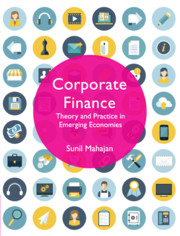Book contents
- Frontmatter
- Contents
- List of Figures
- List of Tables
- List of Corporate Snippets
- List of Abbreviations
- Preface
- Acknowledgements
- 1 Corporate Finance: A Conceptual Introduction
- 2 Financial Markets
- 3 The Time Value of Money
- 4 Capital Budgeting
- 5 Risk and Return
- 6 Valuation
- 7 Capital Structure and Financing
- 8 Dividend Payout: Policy and Practices
- 9 Leverage
- 10 Financial Derivatives
- 11 International Finance
- 12 Working Capital
- 13 Ratio Analysis
- Appendix
- Bibliography
- Index
2 - Financial Markets
Published online by Cambridge University Press: 30 April 2020
- Frontmatter
- Contents
- List of Figures
- List of Tables
- List of Corporate Snippets
- List of Abbreviations
- Preface
- Acknowledgements
- 1 Corporate Finance: A Conceptual Introduction
- 2 Financial Markets
- 3 The Time Value of Money
- 4 Capital Budgeting
- 5 Risk and Return
- 6 Valuation
- 7 Capital Structure and Financing
- 8 Dividend Payout: Policy and Practices
- 9 Leverage
- 10 Financial Derivatives
- 11 International Finance
- 12 Working Capital
- 13 Ratio Analysis
- Appendix
- Bibliography
- Index
Summary
In Markets, there is no such thing as scarcity or oversupply. There is only price.
—AnonymousRaising large amount of funds for establishing and running a business enterprise cannot be done through private ownership and limited partnerships. Corporations are the mainstay of modern commerce and business. They tap large and diverse sources of funds such as individuals, government agencies and financial institutions, both national and global. To facilitate the transfer of funds between suppliers and those who need them, we must have a large and well-regulated mechanism. The financial markets provide such a mechanism for the transfer of funds while also performing many other tasks. In this chapter, we will study the nature, organization, operation and regulation of the financial market.
Financial markets are an essential constituent of an economy and have witnessed a boom in recent times throughout the world. Despite being blamed for the crisis in 2008, more and more countries are taking recourse to financial markets in a bid to improve the state of the economy and their people. Very few wealthy nations, if any, are without an efficient and thriving financial market, whereas hardly any poor country can claim to have one.
It is instructive to understand the role markets play in an economy. Human beings have unlimited wants but their capacity to produce is limited. They need to exchange what they produce with what they wish to consume. Markets for products facilitate the exchange of goods and services and thereby enable us to specialize in our respective areas of expertise. If you want a cup of tea, you do not need to own a tea garden, a sugar factory, a cow for providing milk or a gas service agency. All you need is to continue to do what you are good at—an efficient bureaucrat, a sitar player, a top cricketer or even a teacher—and you can exchange these services for a cup of tea from a tea vendor. By enabling the exchange of goods and services, the product and services markets make it possible to separate the decision to consume from the decision to produce.
- Type
- Chapter
- Information
- Corporate FinanceTheory and Practice in Emerging Economies, pp. 22 - 49Publisher: Cambridge University PressPrint publication year: 2020



